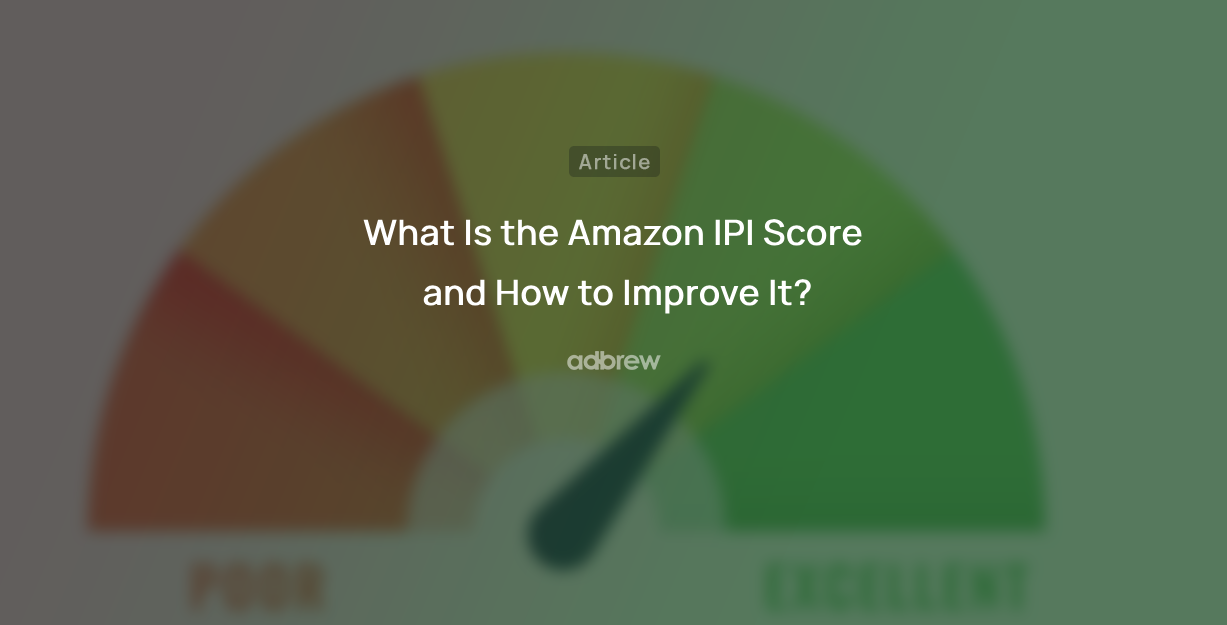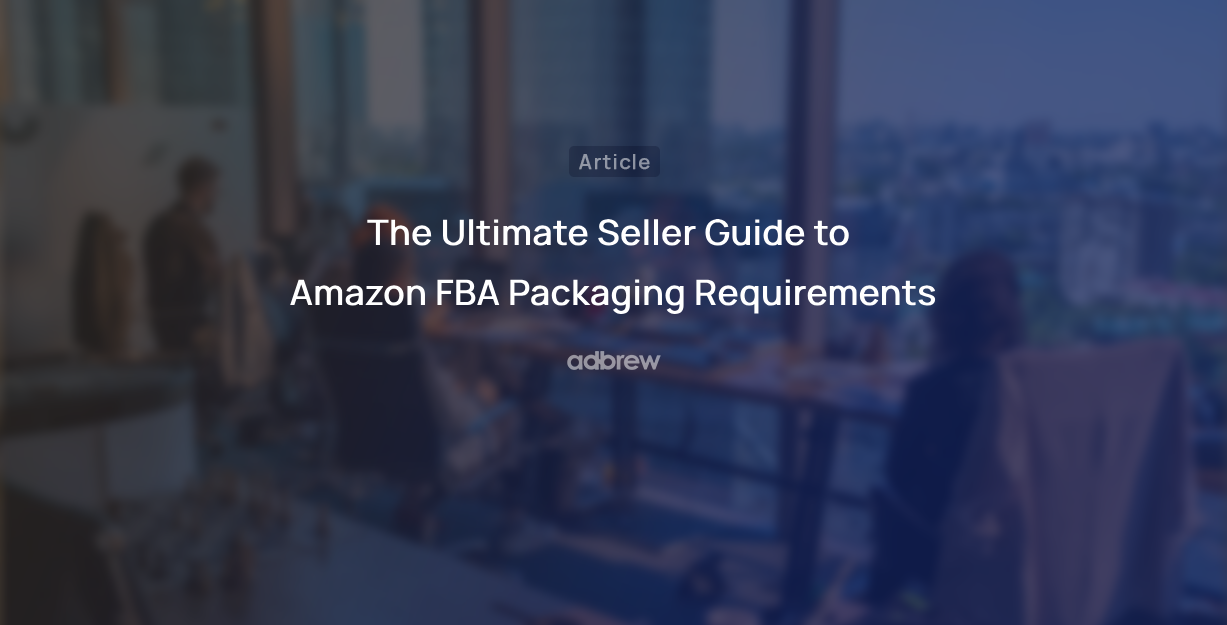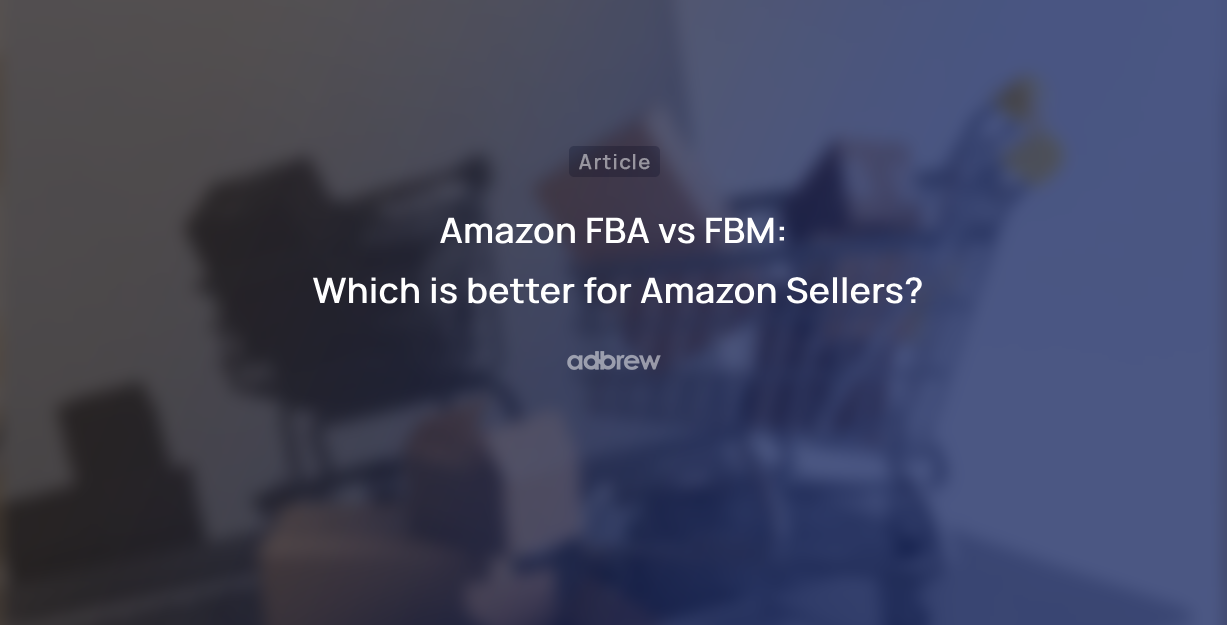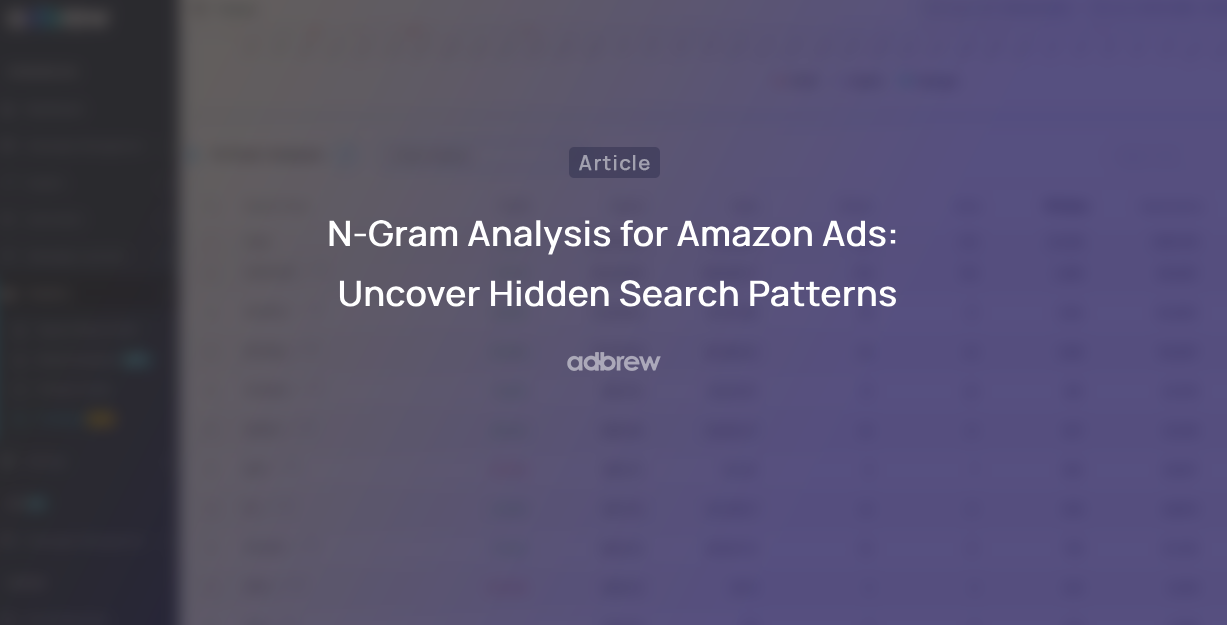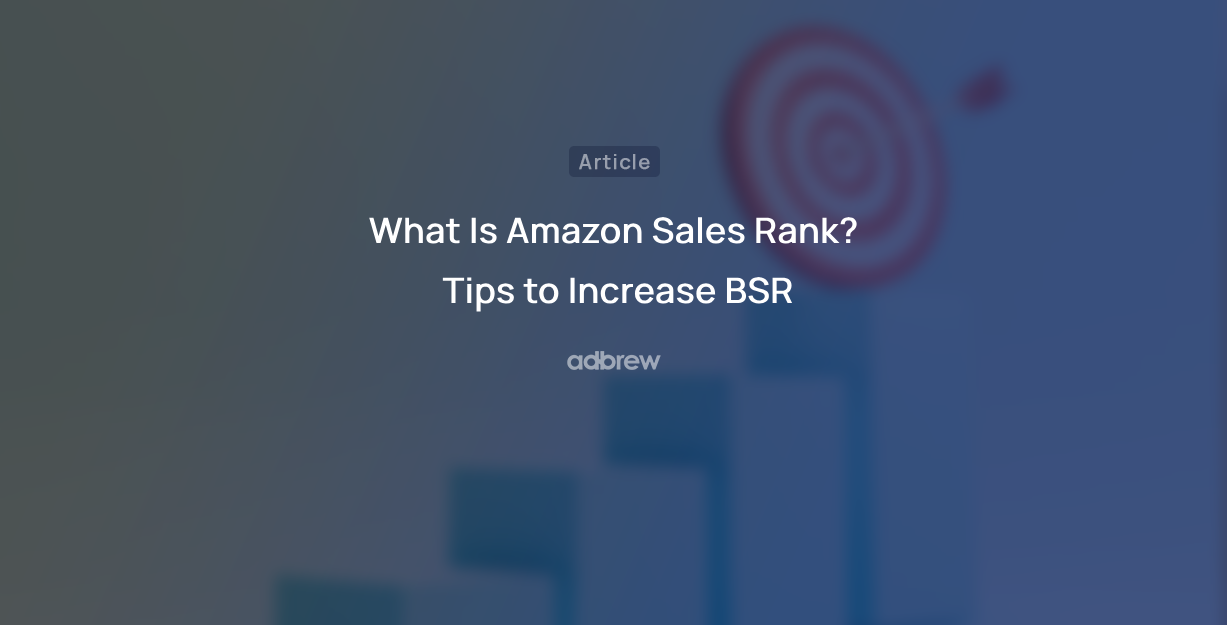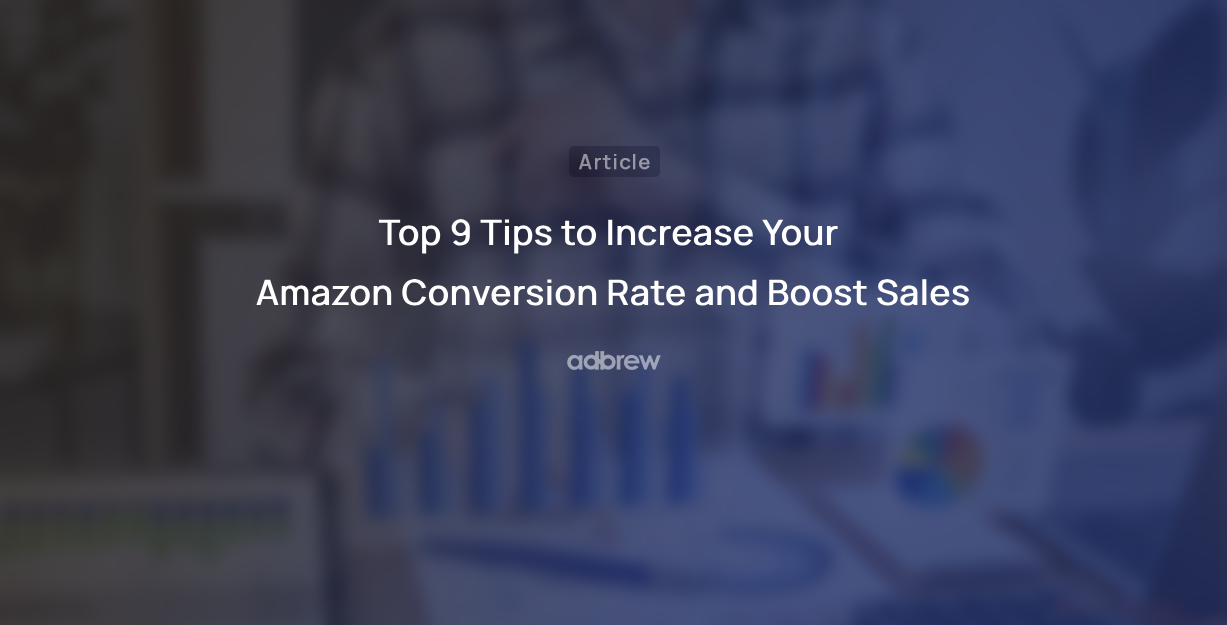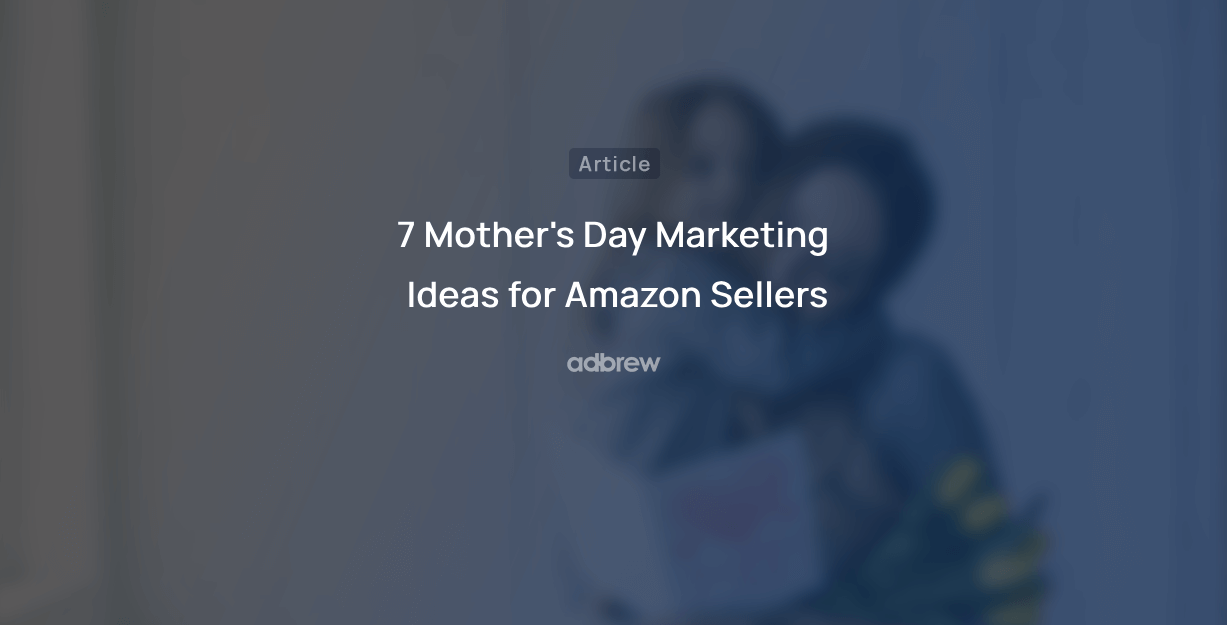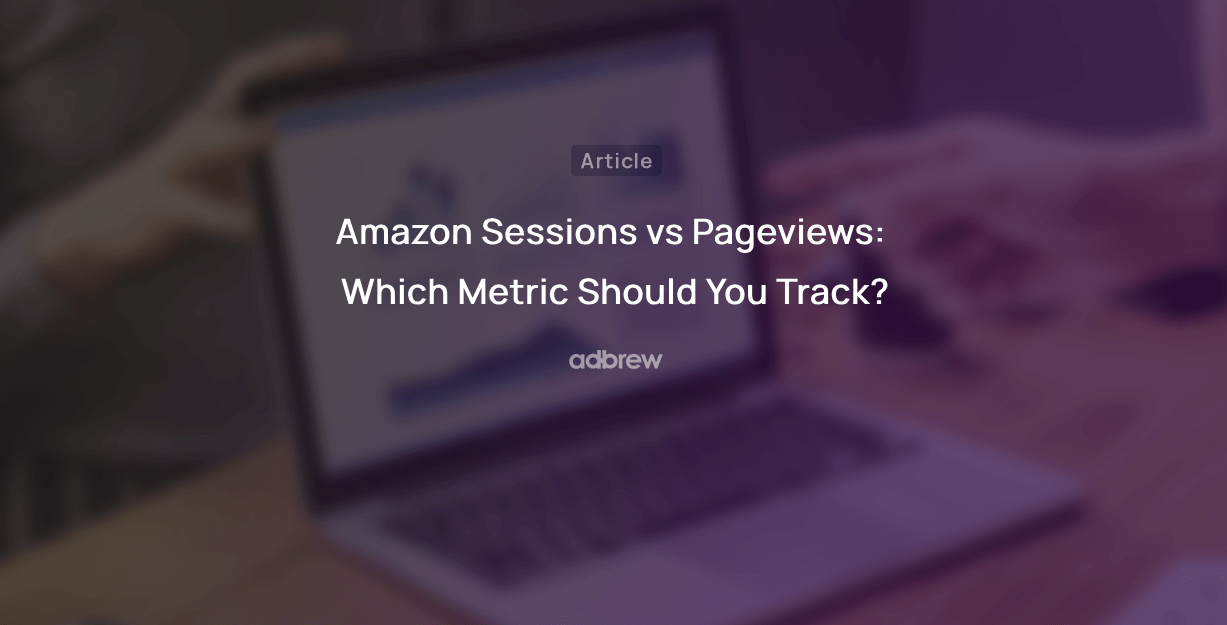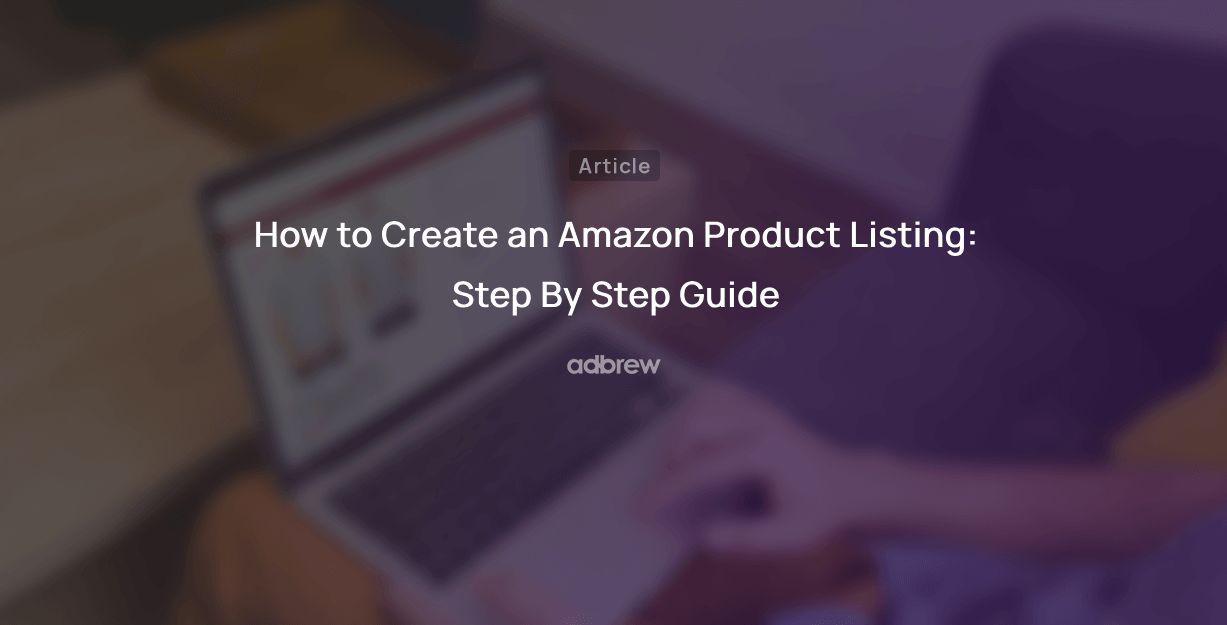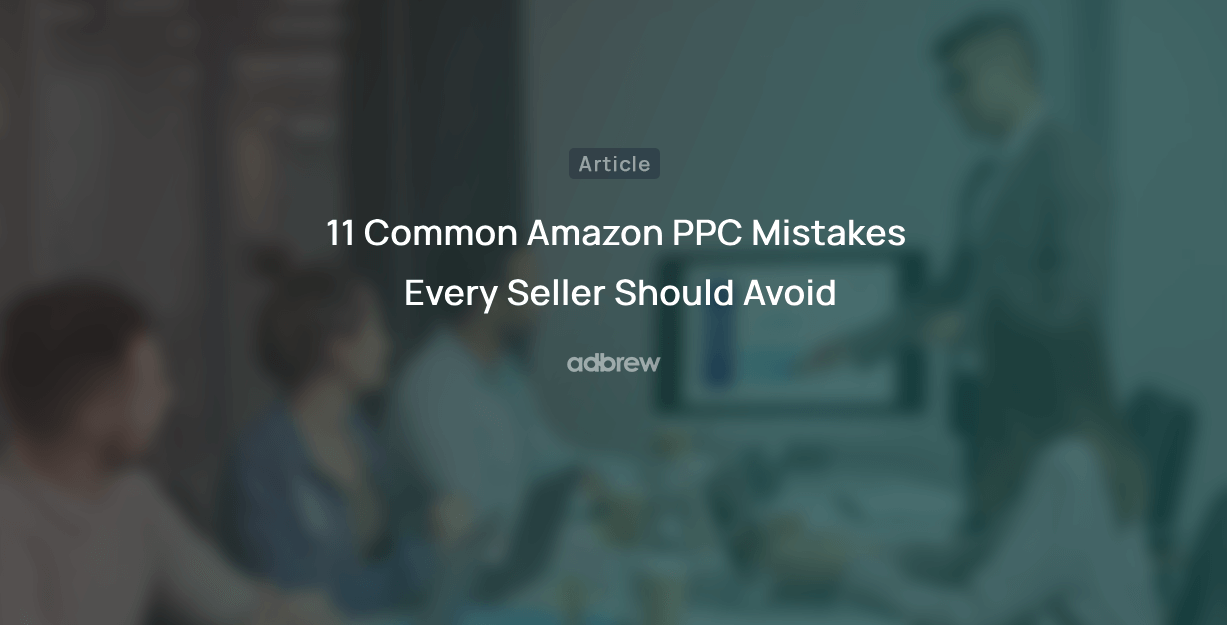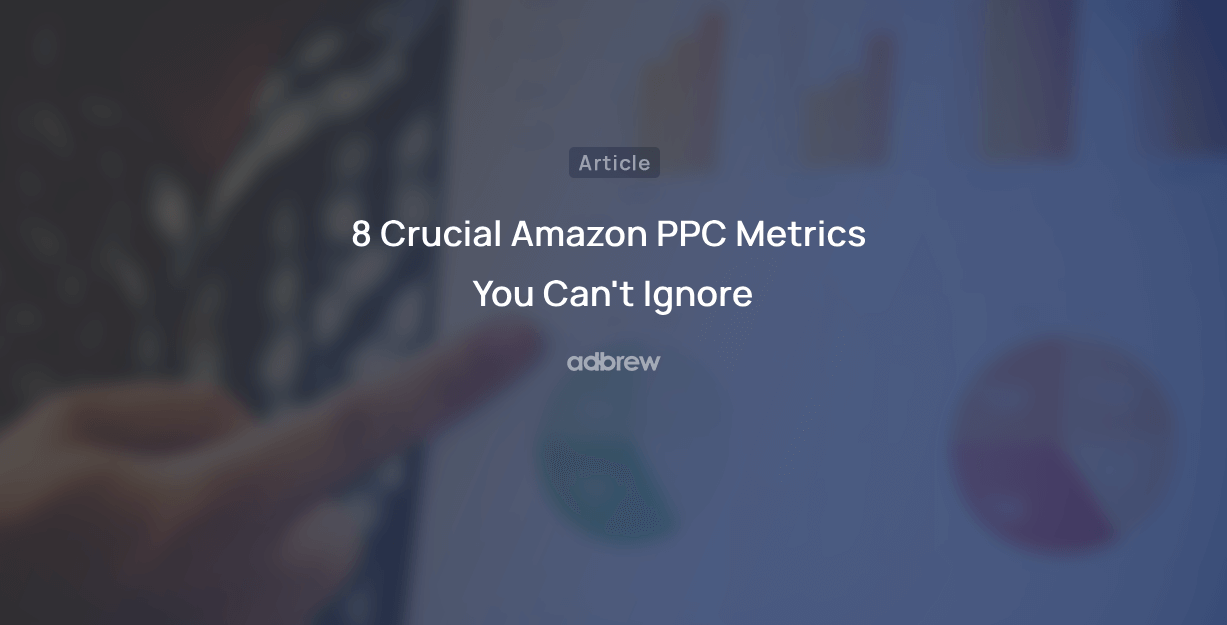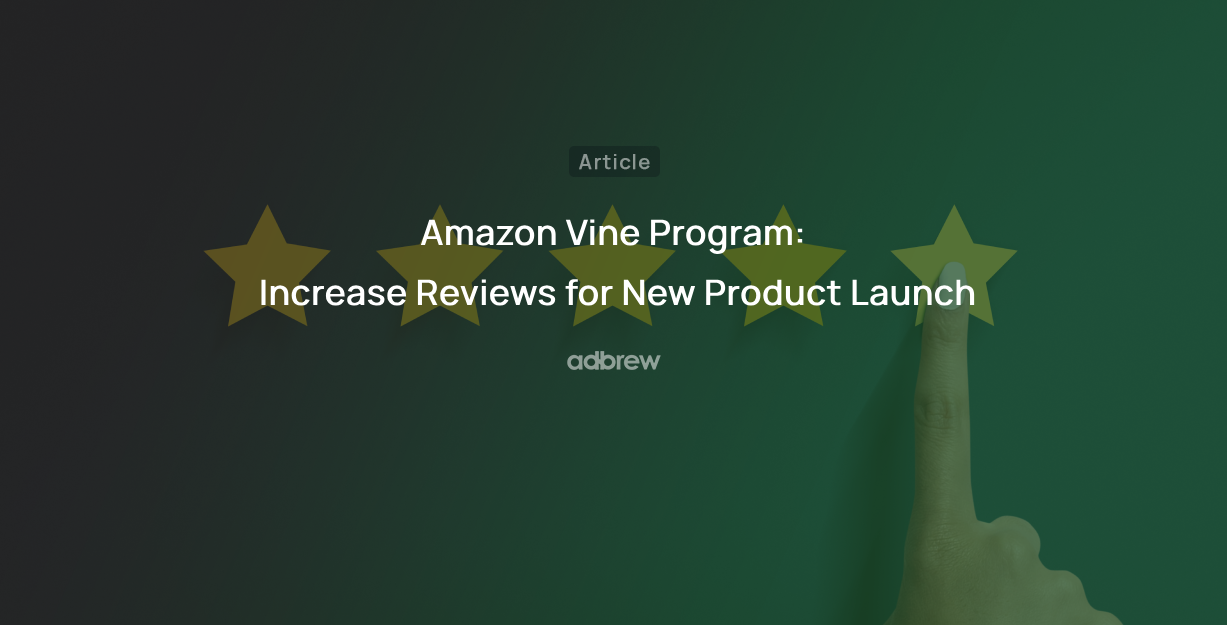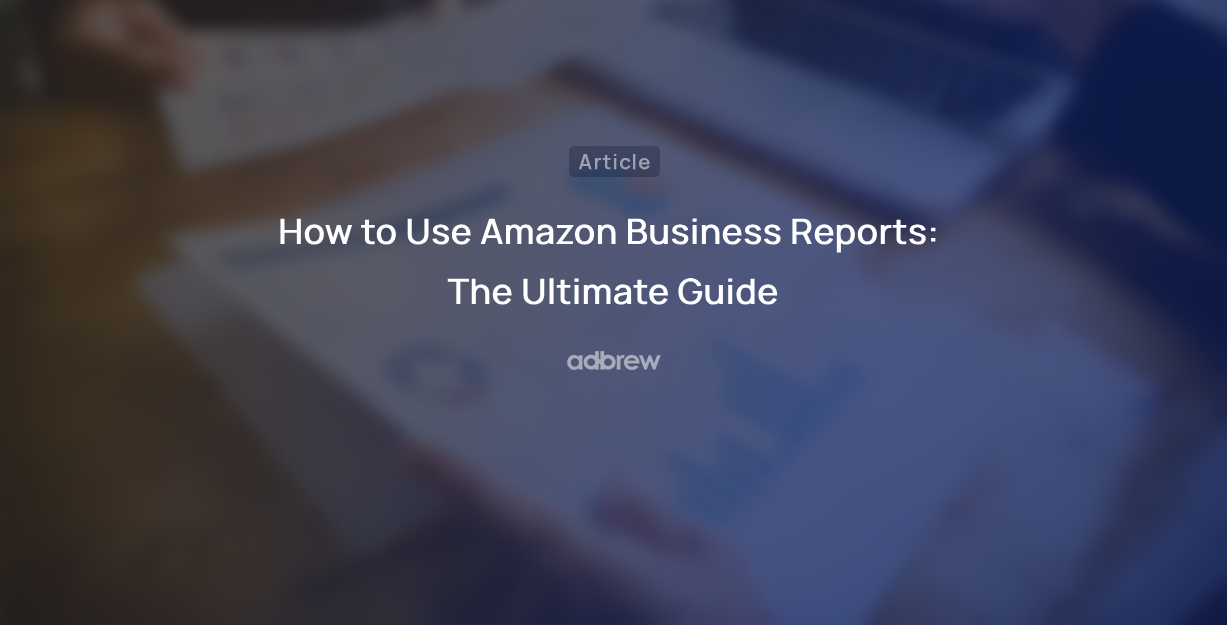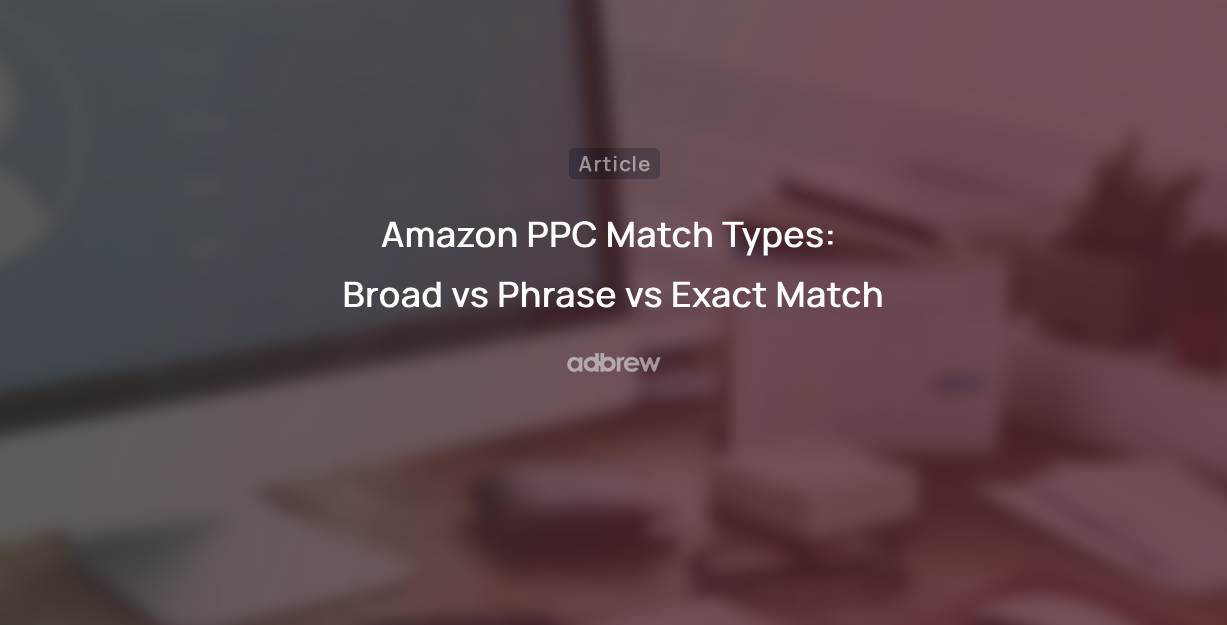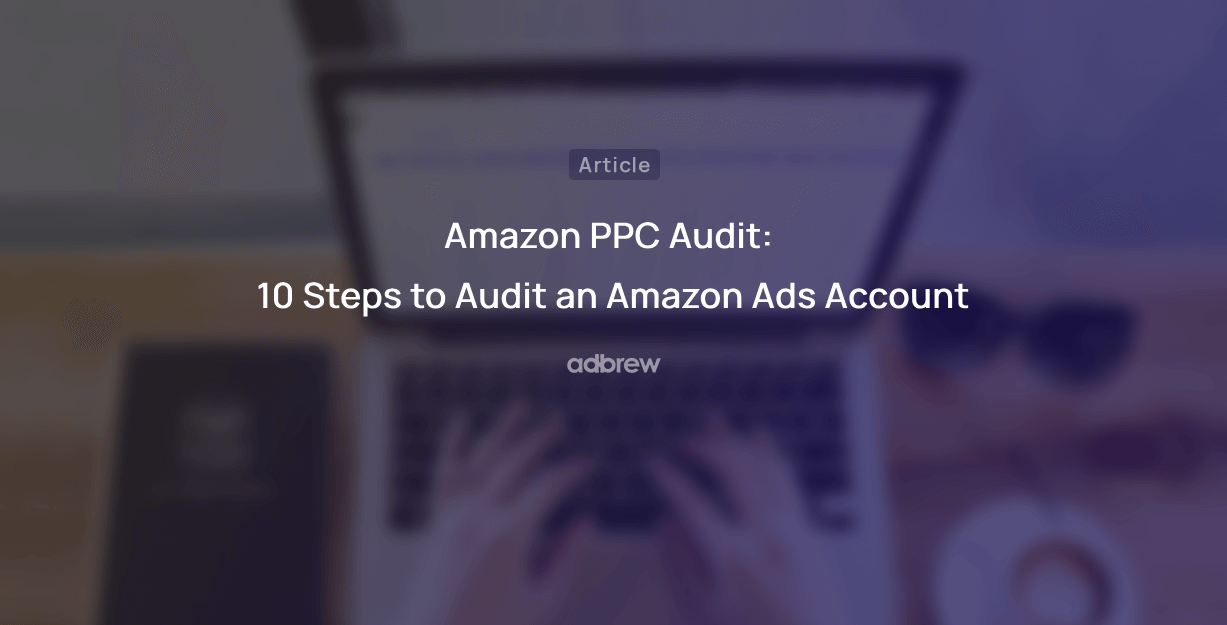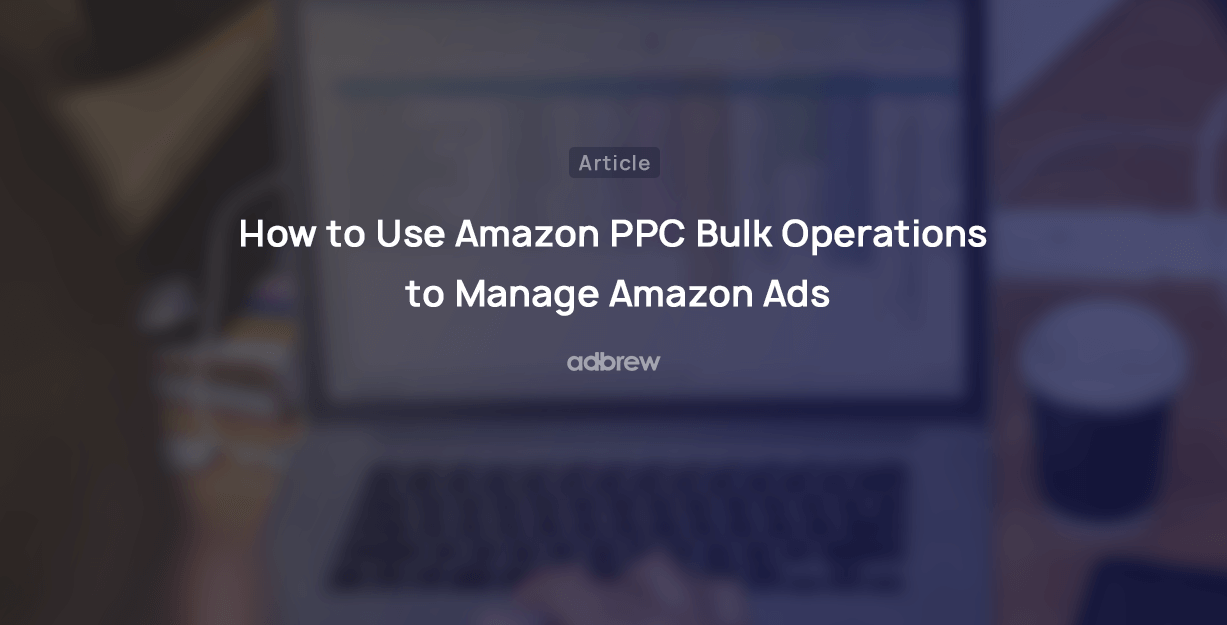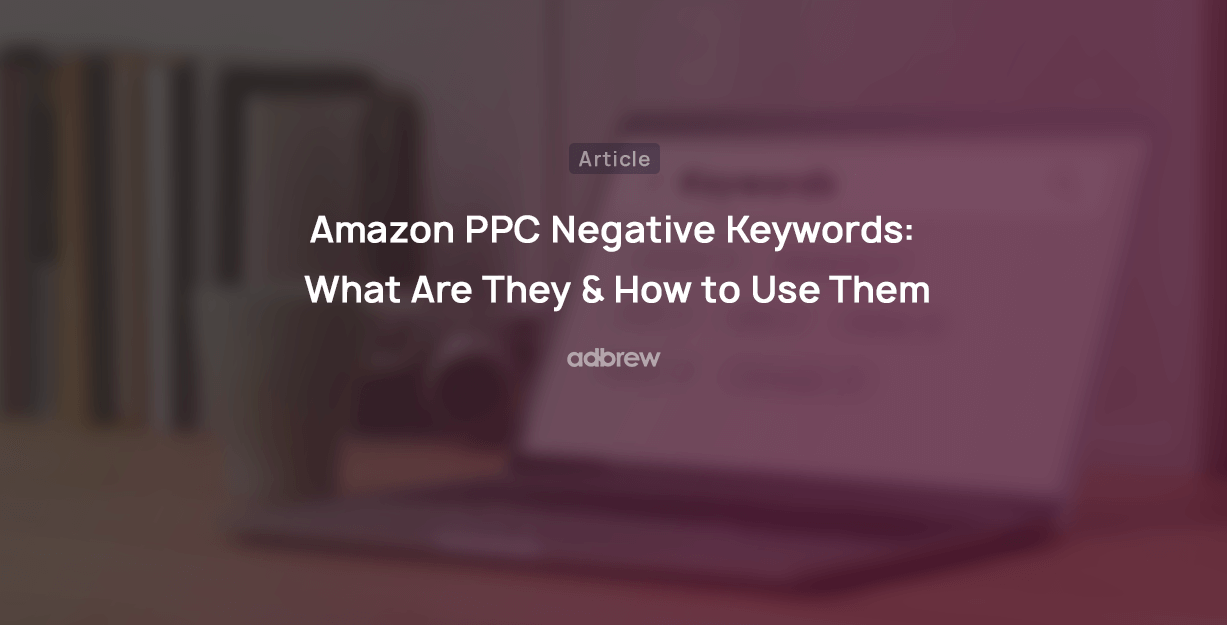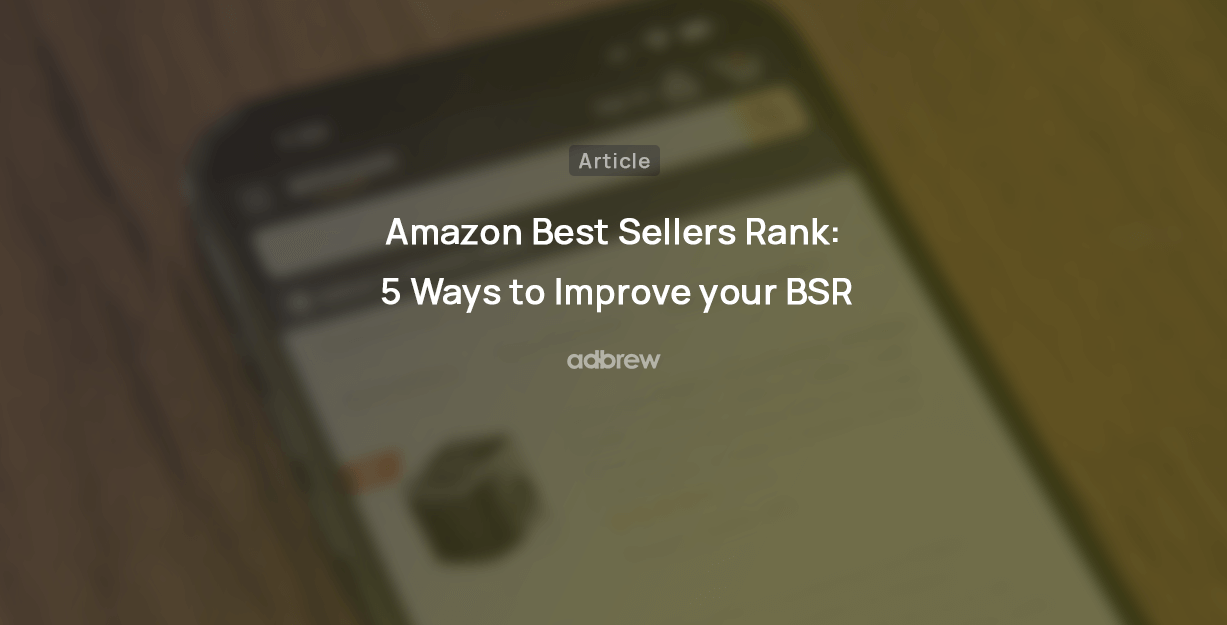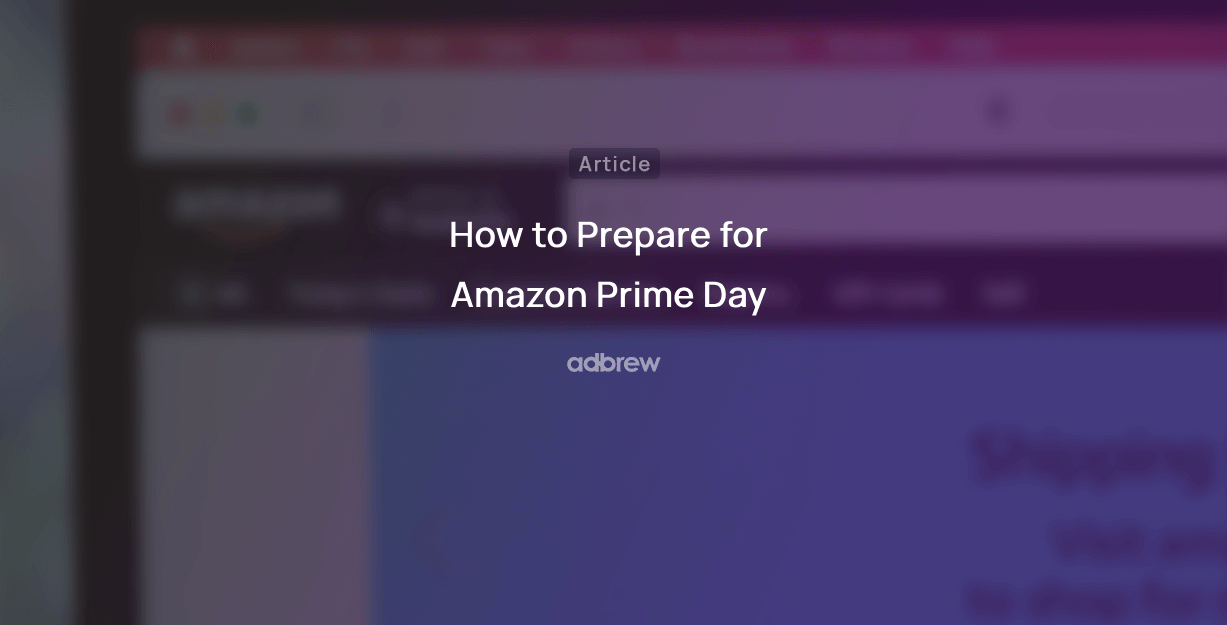
Ever felt like your product is lost in the vast Amazon jungle?
You’re not alone.
With millions of shoppers actively searching, your product’s visibility is crucial. If it’s not showing up when they search, it might as well be invisible.
The solution?
Think like your customers and master the art of simple and effective keyword research.
In this blog post, we’ll guide you through various ways to conduct Amazon PPC keyword research. The goal? Ensure your product doesn’t get lost in the shuffle but stands out exactly when it matters.
Let's first understand basic terminology:
Keywords: Selected words or phrases used by advertisers to target specific audiences.
Search Terms: The actual words or phrases users input into a search engine to find the desired product.
5 Ways to do Amazon PPC Keyword Research
Below, we will share the top 5 sources to generate impactful keyword ideas. The objective is to create a comprehensive list of keywords and then prioritize the most suitable ones for different types of Amazon PPC campaigns.
1. Product Opportunity Explorer
You should always start your keyword research with the Amazon Product Opportunity Explorer tool.
The Product Opportunity Explorer is an Amazon research tool that provides up-to-date data on trends in customer search patterns and product demands for a specific niche.
To get started, navigate to the “Growth” menu from the left sidebar and open the “Product Opportunity Explorer.“
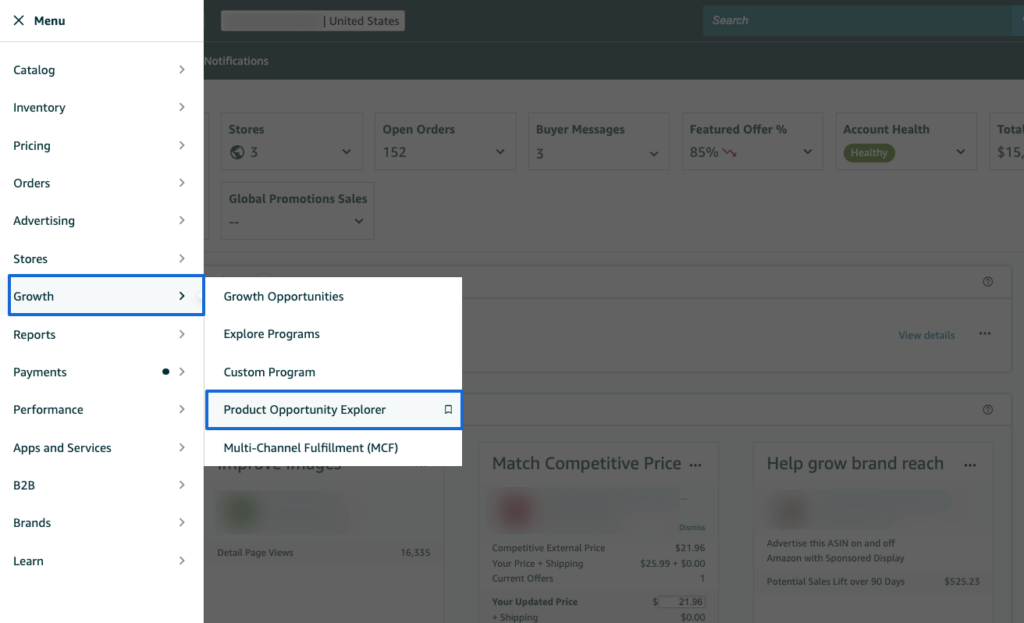
Enter the seed keyword related to your product.
For our example, let’s suppose we are selling essential oil, so let’s enter the particular keyword ‘essential oil’ in the search box.
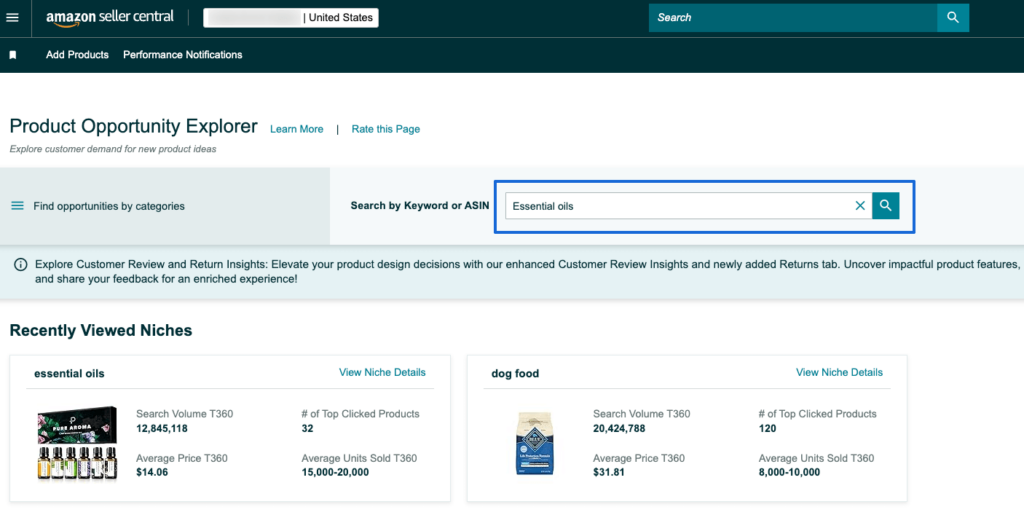
Now, Amazon will give us a list of different closely related customer needs or niches for the product, along with the number of competing products, their demands, average prices, sales numbers, etc.
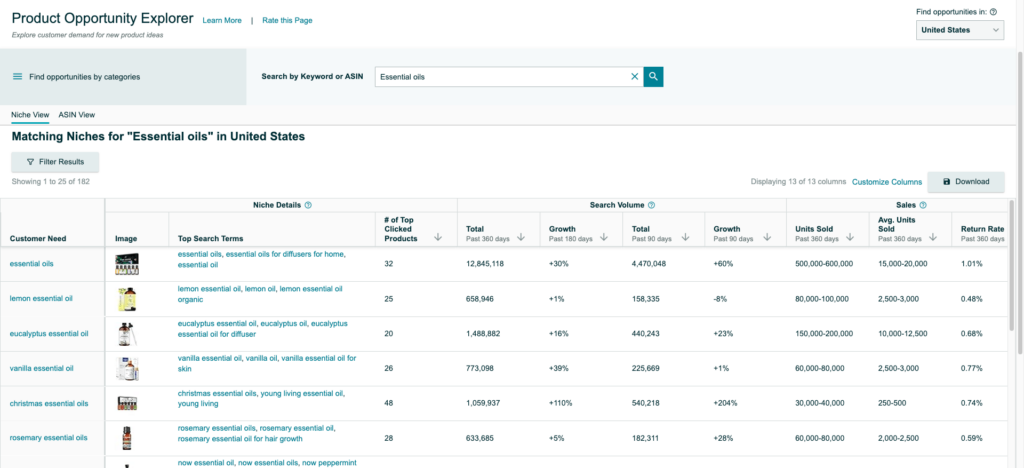
Let’s open the relevant customer needs and move to the search term page.
Here, you’ll get a list of all the relevant search terms that match the customer’s needs, along with their monthly searches, demand, and growth.
You can simply export the search terms by clicking on the ‘download’ button.
2. Amazon Search Query Performance
Amazon Search Query Performance report has been generating a lot of buzz since its launch.
While there are various use cases for this report, it can also be used to research new keywords for Amazon PPC.
Essentially, it provides insights into the top customer searches (i.e., search queries) that lead customers to your brand’s products.
With this report, you can gain a clear understanding of how customers progress through the sales funnel for a given query. It provides your brand’s percentage share for each search term at each stage of the funnel, along with the rank and monthly search volume of the queries.
To access this report, go to Seller Central → Brands → Brand Analytics → Search Query Performance.
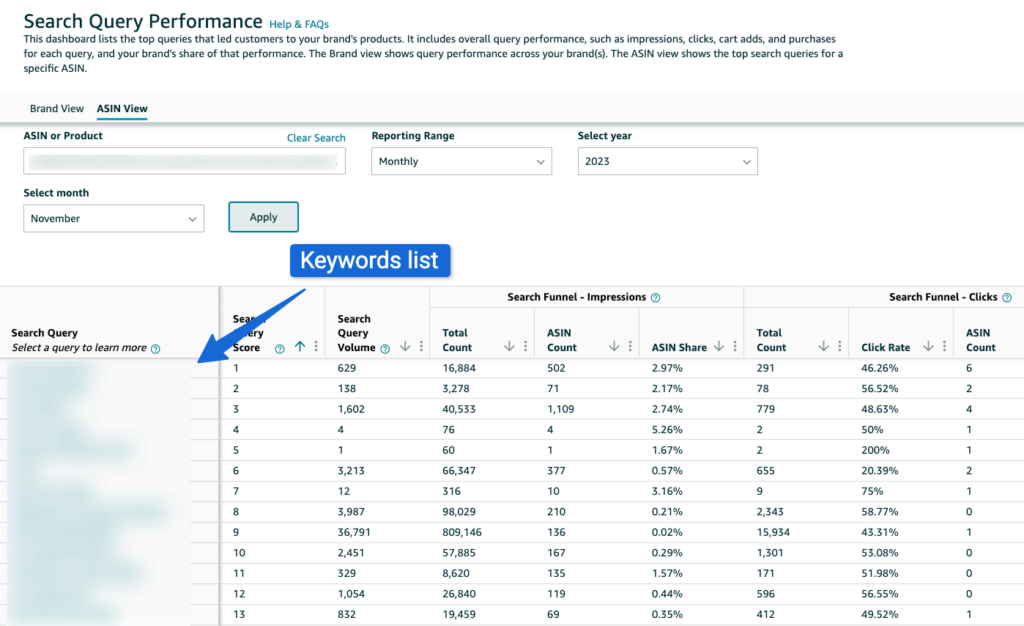
3. Top Search Terms Report
Amazon provides brand-registered sellers with an intriguing report on customer search behavior called Top Search Terms as part of the Brand Analytics tool.
This report offers insights into the most searched terms for products on the Amazon marketplace. It includes a search frequency rank, indicating the popularity of each term, and lists three ASINs that receive the highest clicks and conversions.
Here are two ways to use this tool:
Enter a seed keyword, and Amazon will furnish you with top keywords related to it, along with their popularity metrics.
Alternatively, input your competitor’s ASINs, and Amazon will reveal the top search terms specific to that ASIN.”
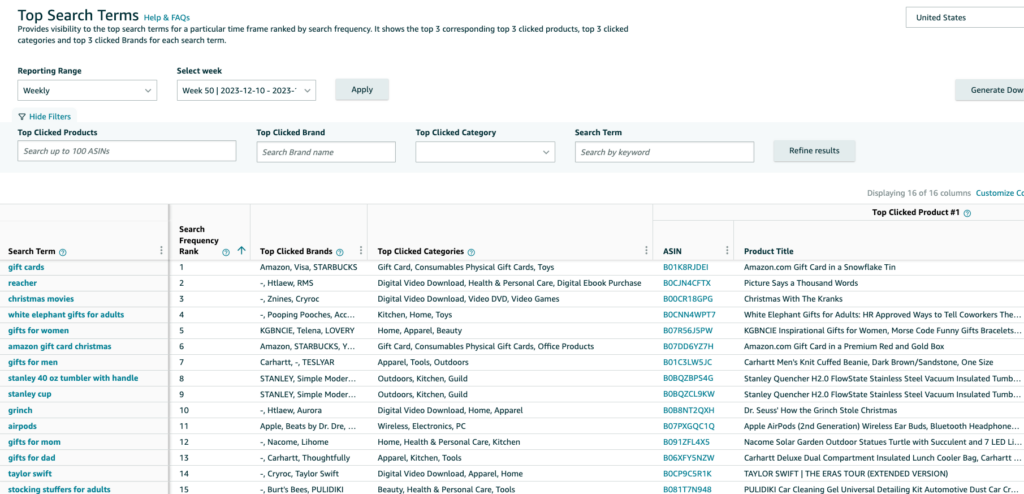
4. Third-Party Tools
Several third-party Amazon keyword research tools are now available, such as Helium 10 and Jungle Scout, that provide a comprehensive database of keywords searched on Amazon, including information about demand and marketplace trends.
Helium 10 offers two noteworthy tools for effective keyword research:
Cerebro: Input your competitor’s ASINs in search bar, and it will reveal the top keywords driving traffic to that product.
Magnet: Enter a broad term related to your product in search bar, and it will uncover numerous associated and relevant keywords.
For each term, the tool provides a wealth of data, including organic search results, volume trends, PPC bids, competition, and more.
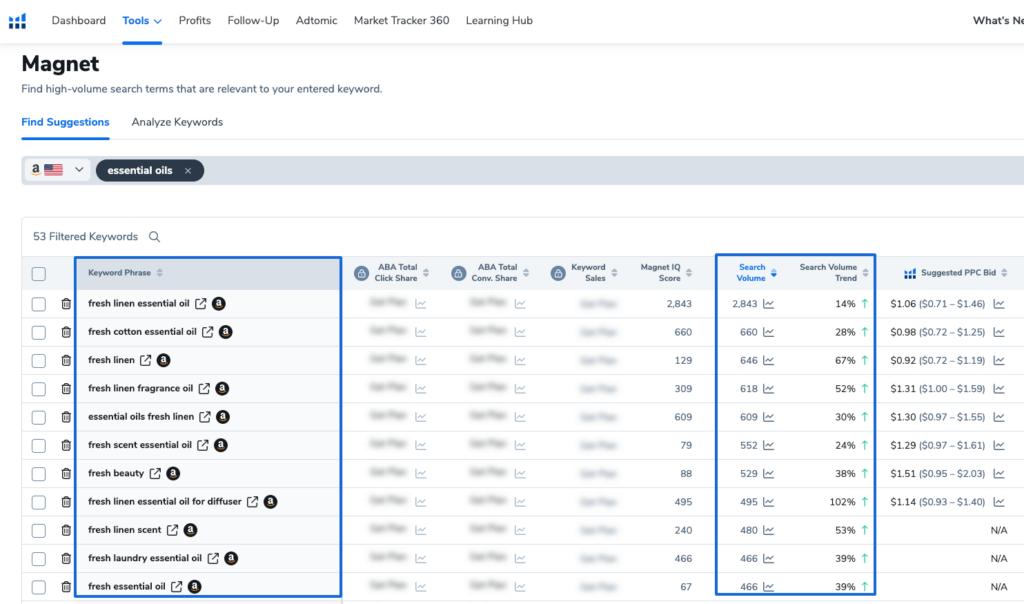
5. Amazon Ads Data
If you’re already running Amazon ads, your existing campaign data holds valuable insights for enhancing your keyword strategy.
We would recommend reviewing your campaign search term report to identify high-potential keywords from the discovery campaign to be targeted in separate campaigns for more efficiency and control.
Adbrew makes it easy to view all your campaign search results and term reports and then narrow down the list based on different criteria and filters.
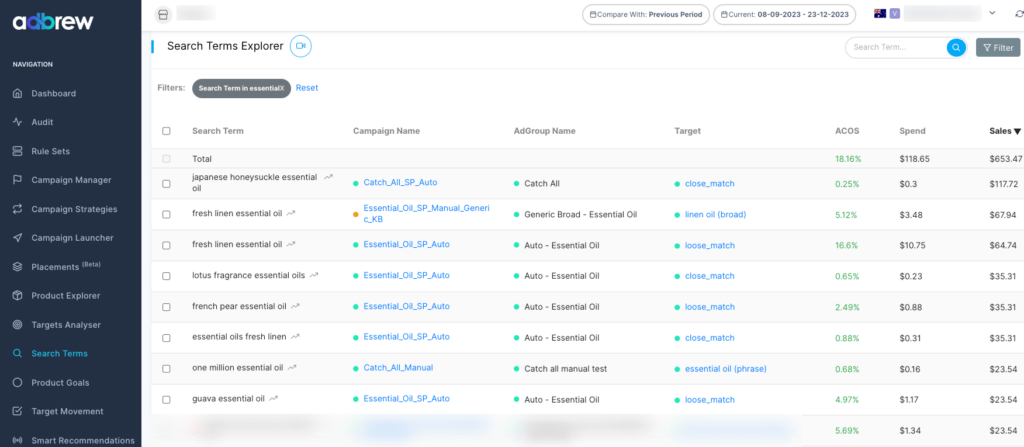
Ready to get started with Adbrew?
Use Adbrew Automation to automatically identify high performing search term in discovery campaigns and move to performance campaigns.
How to sort and filter the keyword list?
Once you’ve compiled your list of targeted keywords above, it’s time to refine and organize them for your Amazon PPC campaign.
We suggest categorizing your keywords into three buckets: Golden Keywords, Efficiency Keywords, and Related Keywords.
Golden Keywords
These Keywords are crucial for driving significant traffic to your product within your niche. These are the terms with high relevancy and high search volume. For instance, if you’re selling essential oils, keywords like ‘essential oils,’ ‘fragrance oils,’ and ‘candle fragrance oil’ would be considered Golden Keywords.
Efficiency Keywords
They may not have high search volumes but are still relevant to your product. Examples of valuable keywords could include ‘fragrance oil for candle making,’ ‘candle essential oil scents,’ and ‘scented oil for aromatherapy.’
Related Keywords
These keywords may not perfectly match your product attributes, but individuals searching for these terms might still be interested in your product. For a brand selling ‘essential oils,’ Related Keywords could be ‘home fragrance,’ ‘cozy home essentials,’ and ‘fresh linen perfume.’
Final thought on Amazon PPC keyword research
In conclusion, the foundation of a successful Amazon ad campaign lies in the diligence of your keyword research and precise targeting. Don’t let it overwhelm you – with accessible sources, finding and refining the right keywords aligns seamlessly with a well-thought-out advertising strategy. By investing time in this crucial aspect, you pave the way for hidden keywords for enhanced visibility and relevance, ultimately maximizing the effectiveness of your Amazon PPC advertising spend.
Frequently Asked Questions
Why Keyword Research is important?
Keyword research is vital for Amazon sellers as it determines the visibility of their products in search results. Identifying relevant keywords ensures that product listings are optimized, making them more likely to appear when potential customers search for specific items.
By finding the best keywords, sellers can enhance their product’s discoverability, attract relevant traffic, and ultimately increase sales. This process is essential for navigating Amazon’s competitive marketplace, helping sellers stay ahead by aligning their listings with the search terms most frequently used by their target audience and customers.
How to add keywords to my product listings?
You can integrate keywords within the product listing components, including the title, bullet points, description, A+ content, and backend keywords on Amazon.
What are Seed Keywords?
Seed keywords are the foundational terms utilized at the initial stage of the keyword research process, providing a broad overview of the product. These initial keywords act as the starting point for discovering more about specific search phrases and relevant variations during the exploration phase.
What are long tail keywords on Amazon?
Long-tail keywords on Amazon are specific and detailed search queries, typically comprising three or more words. These highly specific keywords enhance product discoverability, helping sellers reach a niche audience and increase the chances of conversions.
Integrating long-tail keywords into product listings optimizes visibility and attracts customers with specific purchase intent on Amazon.
Recent Posts
Take your Amazon PPC advertising to the next level

Related Blogs
Running Amazon ads with an empty shelf? You might as well be burning cash. Many sellers focus on optimizing bids, […]
In today’s competitive digital landscape, growing your eCommerce brand requires more than just a standalone website or a single marketplace […]
Are you an Amazon seller looking to offload excess inventory or seasonal items? The Amazon Outlet program might be just […]
Turning your bookshelf into a source of income has never been easier, thanks to Amazon. If you have books collecting […]
If you’re an Amazon seller, encountering an account suspension or policy violation can be a significant setback. But with the […]
Introduction Amazon dropshipping is an increasingly popular way to run an e-commerce business without the need to store or ship […]
Introduction The Amazon Influencer Program is a great way for content creators to turn their influence into earnings. This program […]
Introduction Amazon Kindle Direct Publishing (KDP) is a platform that allows authors to self-publish their work as ebooks or print […]
Selling on Amazon offers many opportunities for businesses, but it’s essential to understand the costs involved with Fulfillment by Amazon […]
Walmart is quickly becoming a popular platform for brands and sellers to connect with more customers. One way to boost […]
In today’s competitive retail landscape, reaching the right audience at the right time is crucial for success. Walmart’s Demand Side […]
In today’s fast-paced eCommerce landscape, shoppers demand speedy delivery. Walmart has responded by offering 2-day shipping, giving sellers on the […]
Running successful Walmart advertising campaigns takes more than just setting them up—it requires ongoing optimization. A Walmart PPC (Pay-Per-Click) audit […]
Are you ready to tap into the massive potential of Walmart Marketplace? With millions of daily visitors and a loyal […]
In the world of e-commerce, Amazon and Walmart reign supreme, dominating the retail landscape. These two giants offer vast opportunities […]
Are you a brand owner struggling to maintain control over your products on Walmart? The Walmart Brand Portal is here […]
Are you dreaming of a passive income stream from your Walmart store? The allure of an automated Walmart store with […]
Are you a seller looking to tap into the massive market of private-label brands? Walmart, one of the world’s largest […]
Tired of your Walmart products getting lost in the shuffle? In this blog post, we’ll dive into the essential strategies […]
Ever wondered why some Amazon sellers seem to have a magic touch with product bundles? It’s not luck—it’s strategy. Bundling […]
If you’re a Walmart seller looking to grow your business through retail media, Walmart Connect could be a game-changer. But […]
If you’re an Amazon seller, you may have noticed a portion of your inventory marked as “reserved” without knowing exactly […]
Have you ever wondered what managing your own Amazon orders is like? Switching from Fulfilled by Amazon (FBA) to Fulfilled […]
Walmart Marketplace offers an exciting opportunity for sellers to reach a vast audience by listing their products on Walmart’s platform. […]
Selling products on online marketplaces has become a vital strategy for businesses to reach more customers. If you’re looking to […]
Are you a Walmart seller aiming to improve your visibility and sales? In this blog, we will explore Walmart SEO, […]
As an Amazon brand owner, maintaining control over your product listings is essential to protect your brand’s reputation and customer […]
Improving your sales on Walmart starts with understanding how to consistently win the Buy Box. Securing this position can make […]
Are you an Amazon seller struggling to increase your rating? A high seller rating is crucial for attracting new customers […]
As an Amazon seller, providing the best customer service is paramount to maintaining a positive customer experience. One key metric […]
If you’re an Amazon seller and curious about Amazon IPI score and its impact on your business, this blog post […]
Introduction Starting an Amazon subscription box business presents a unique opportunity to tap into the growing trend of curated, recurring […]
Thinking about using Fulfillment by Amazon (FBA) to sell on the Amazon marketplace? Awesome! But before you box up your […]
Thinking about using Fulfillment by Amazon (FBA) to streamline your Amazon business? While FBA offers a convenient way to store […]
For FBA sellers, the Amazon Buy Box is the holy grail of product visibility. But with constant algorithm updates and […]
Have you ever wished you could offer customers pre-made packages of complementary products without the hassle of physically bundling them […]
Have you ever wanted to create a more branded and engaging presence for your products on Amazon? An Amazon storefront […]
Are you storing items on Amazon for a while? If so, it’s important to be aware of Amazon long term […]
When selling products on Amazon, it is crucial to follow their packaging requirements, rules, and guidelines. Proper packaging ensures that […]
Amazon A/B testing can significantly enhance your product listings and boost sales. This method, also known as split testing, involves […]
Have you ever browsed Amazon and stumbled upon a product with a little blue badge that reads “Amazon’s Choice“? It […]
Amazon FBA vs FBM needs to be explored, when we ship products and handle orders while selling on Amazon. With […]
Ever feel like you’re missing something in your Amazon PPC Search Terms report? You might be! Sure, they show what […]
Amazon can be a fantastic platform to reach new customers, but keeping your virtual shelves stocked can get tricky. That’s […]
Navigating Amazon as a new seller can be tough, but there are tools and programs available to help such as […]
Have you ever scrolled through an Amazon search result page and noticed product recommendations nestled alongside the standard listings? These […]
Finding time for yourself while selling on a competitive marketplace like Amazon can be challenging. As a seller, your main […]
Starting an E-commerce business has become quite easy with Amazon, but it also brings heavy competition. Millions of Amazon sellers […]
As an Amazon seller, you know the importance of getting your products seen. But with millions of listings, how do […]
Ever scrutinized an Amazon product page and noticed the cryptic “Sales Rank”? Wondering what it means and how it impacts […]
Millions of products compete for customer attention on Amazon’s search results page, making it tough for your brand to stand […]
Are you selling products on Amazon and looking to increase your sales? This blog is for you. We’ll share tips […]
Are you an Amazon seller looking to boost your brand visibility and profitability? Are you feeling stuck in the cycle […]
Ever wonder what drives your online shopping habits? Perhaps a captivating product description, or an eye-catching professional photo? As it […]
For any seller on Amazon, understanding the A9 algorithm is crucial for success. This complex algorithm dictates which products appear […]
Are you an Amazon seller looking to turn those single purchases into recurring revenue? Look no further than the Subscribe […]
Amazon has become a go-to platform for all e-commerce business owners to launch and scale their e-commerce brands online. But […]
Mother’s Day, a time to celebrate the incredible women who raised us, is a prime opportunity for Amazon sellers to […]
In the ever-competitive landscape of Amazon, ranking high in organic search results is crucial for driving sales. While you might […]
If you’ve ever found yourself scratching your head over Sessions and Pageviews on your Amazon business reports, you’re not alone. At […]
Amazon is a massive marketplace, attracting millions of customers with diverse needs, preferences, budgets, and mindsets for shopping. To effectively […]
With Amazon boasting over $575 billion in retail sales for 2023, it’s no wonder so many sellers flock to its […]
Advertising on Amazon through pay-per-click campaigns can significantly enhance product visibility and sales for sellers. However, mastering Amazon PPC, with […]
Have you heard of the terms copyright infringement and plagiarism? If so, then Amazon Brand gating won’t be unfamiliar to […]
If you are running ads on Amazon, you’ll come across a sea of data in your advertising console. But does […]
Have you heard of the terms copyright infringement and plagiarism? If so, then Amazon Brand gating won’t be unfamiliar to […]
In the fast-paced world of e-commerce, where shoppers are bombarded with choices, standing out on platforms like Amazon is paramount […]
Are you planning to start an Amazon FBA store? If so, you’ll encounter a unique term – FNSKU. This seemingly […]
As an Amazon seller, you understand the power of reviews. They’re the lifeblood of trust and conversion on the platform. […]
Are you struggling to get Amazon reviews on your product? Well, you are not alone! Reviews are the backbone of […]
Are you tired of bland Amazon product listings failing to grab attention? In today’s competitive online marketplace, standing out is […]
As an Amazon seller, understanding how your brand performs throughout the customer journey is vital for success. However, until recently, […]
As an Amazon seller, optimizing your business and maximizing profits relies heavily on data analysis. One invaluable tool for gaining […]
Are you struggling to get noticed on Amazon’s massive platform? Do your products get lost in a sea of similar […]
For any Amazon seller getting into the world of sponsored advertising, understanding the Advertising Cost of Sale (ACoS) is crucial. […]
A well-executed Amazon product launch strategy can be the key to unlocking success and gaining a competitive edge. As the […]
In the ever-evolving landscape of e-commerce, distinguishing between keywords and search terms is vital for optimizing product visibility and driving […]
Ever felt like you are throwing darts in the dark when it comes to your marketing efforts outside Amazon for […]
Amazon, the e-commerce giant, has successfully concluded a robust business year with outstanding performance in quarter 4. The most recent […]
Picture this: you have a great product on Amazon, but it’s not selling well despite having attractive images and a […]
The advertising landscape is evolving, and viewers are rapidly migrating from traditional cable TV to streaming platforms. This presents a […]
Feeling lost in the Amazon discount jungle? Struggling to reach the right customers and entice them to make the purchase? […]
Are your products getting lost in the vast ocean of Amazon listings? Do you want them to stand out, rank higher, […]
For years, Amazon sellers were in the dark. They couldn’t see what keywords customers were using to find their products, […]
Selling on Amazon can be tough with so many others doing the same in your category. That’s why it’s super […]
For Amazon sellers, understanding their customers has often felt like navigating a maze without a map. The missing link? A […]
Have you ever felt like your Amazon advertising campaigns are lost in a tangled jungle of keywords? You’re not alone. […]
When did you last give your Amazon PPC account a checkup? Regular Amazon PPC audits are crucial to ensure the […]
Embarking on the path of online selling? If so, you’re likely aware that Amazon is your ultimate destination. With a […]
Ever felt like your product is lost in the vast Amazon jungle? You’re not alone. With millions of shoppers actively […]
Amazon Sellers selling on the Amazon marketplace usually utilize Amazon advertising without keeping a close eye on the TACoS metric. […]
The rush of Black Friday and Cyber Monday might be over, but the opportunity for continued sales growth extends beyond […]
In the fierce Amazon advertising domain, where competition rises and costs increase, understanding and keeping track of the right metrics […]
Have you ever felt the frustration of campaigns going out of budget, leading to missing out on potential sales, or, […]
Amazon PPC campaigns can be a powerful tool for driving traffic and sales to your products. However, without proper structure, they […]
Whether you are creating a new advertising campaign or optimizing existing ones, doing it manually from the Amazon ad console […]
Want to know what search terms people use to visit or purchase your product on Amazon? If yes, you’re in […]
When you are spending dollars or even more to get a click on your Amazon ads, you want to ensure […]
Are you an Amazon seller looking to maximize your profits and minimize your advertising costs? If so, you’re not alone. Many […]
Are you exclusively relying on traditional metrics such as CTR, CPC, CVR, or ROAS to make your campaign optimization decisions? […]
Navigating the ever-evolving landscape of Amazon’s online marketplace is essential for any seller looking to thrive on the platform. Among […]
As the holiday season approaches, businesses are gearing up for the highly anticipated Q4 rush. To ensure a successful Q4, […]
Do you regularly review your Amazon advertising reports? If not, you may be missing out on numerous opportunities. Amazon […]
Whether you’ve just launched a new product or have been selling on Amazon for a while, advertising on the platform […]
Amazon PPC bidding strategies that you choose play a significant role in the success of your Amazon Ads campaigns. As […]
Have you ever heard of a “catch-all campaign”? This single campaign can generate extra sales for you at a very […]
Amazon Prime Day is one of the largest global e-commerce sales events, attracting millions of customers worldwide. But how do […]
Are you looking to boost your brand’s visibility and drive more sales on Amazon? Look no further than Amazon Sponsored […]
Succeeding on Amazon in 2024 isn’t easy. Just listing your products and hoping for the best won’t work anymore. You […]
Are you bidding the same amount for all your ad placements on Amazon? If yes, then you’re missing out on […]
Whether you are looking to boost product discovery or target audiences further down the sales funnel who have already engaged […]
We, at Adbrew catalyze millions of dollars of ad spend monthly through our platform, with Sponsored Product Ads being the […]
Do you want to know how many clicks you should give a search term before adding it as negative in […]
Think of your product listing as a guiding light on the Amazon marketplace. It’s your chance to grab attention, tell […]
It is no longer a secret that shopping behavior on Amazon varies over the day. This is the reason why […]
Are you struggling to get the most out of your advertising budget on Amazon? Do you find that your campaigns […]
Ever run an Amazon Ad campaign and wondered why some sales weren’t directly linked to the products you advertised? That’s […]
If you’re managing Amazon PPC ads, it’s essential to have an effective and organized approach for target harvesting and movement. […]
































